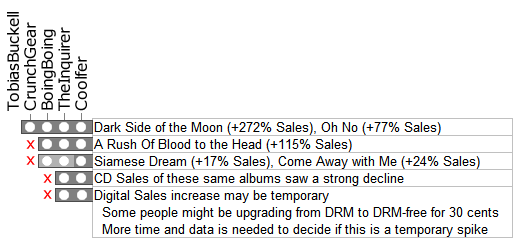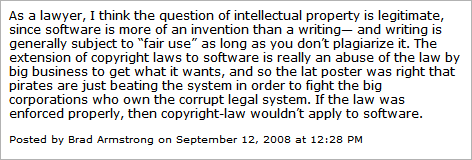I’ve called out the EFF and Doctorow in the past for fearmongering. Well, their latest articles take the cake. Apparently, being a “consumer advocate” is a great way to garner fame, scare the public into doing what you want, and set yourself up for donations by protecting them from the big bad wolf. Let me explain.
The RIAA and MPAA recently released a 23-page document containing suggestions to the government on enforcing copyright law. The EFF wrote up an article commenting on it, and Doctorow picked it up and commented on it further.
From the EFF (quotes from the RIAA/MPAA article are double-indented):
The Entertainment Industry’s Dystopia of the Future
We’re not easily shocked by entertainment industry overreaching; unfortunately, it’s par for the course. But we were taken aback by the wish list the industry submitted in response to the Intellectual Property Enforcement Coordinator’s request for comments on the forthcoming “Joint Strategic Plan” for intellectual property enforcement.
…
“Anti-infringement” software for home computers
There are several technologies and methods that can be used by network administrators and providers…these include consumer tools for managing copyright infringement from the home (based on tools used to protect consumers from viruses and malware).
Okay, now at this point, you should be asking yourself, “Gee, why would someone install tools to ‘manage’ copyright infringement from the home? Afterall, if someone is a pirate, they aren’t going to install these tools. If they aren’t a pirate, then what’s the point of installing the tools?” One possibility is that parents could install the tools to prevent their kids from getting involved in piracy, similar to the way that “NetNanny” prevents children from accessing porn:
Net Nanny Products from ContentWatch provide Internet Protection software, including parental controls and internet filtering software, computer cleaning …
I suppose that’s one possibility. It’s not clear what exactly was meant by the RIAA/MPAA suggestion. Certainly, they would have no standing to force people to install this software, and it would be a gross violation of privacy anyway. I’m sure the RIAA/MPAA is smart enough to realize this. The EFF and Doctorow, of course, imagine darker scenarios:
EFF:
In other words, the entertainment industry thinks consumers should voluntarily install software that constantly scans our computers and identifies (and perhaps deletes) files found to be “infringing.” It’s hard to believe the industry thinks savvy, security-conscious consumers would voluntarily do so. But those who remember the Sony BMG rootkit debacle know that the entertainment industry is all too willing to sacrifice consumers at the altar of copyright enforcement.
Apparently, the EFF didn’t consider the “people with children” case.
Doctorow takes the EFF’s suggestion into darker territory:
spyware on your computer that detects and deletes infringing materials;
I’ve seen Doctorow exaggerate plenty of times in the past, but this is quite a stretch. The term “spyware” is generally used to describe a program that is acting on the orders of some other third party, outside your control, while reporting information back to that third-party. None of those three items describes what they’re talking about. He also seems to be suggesting that “big content” is going to force this application onto your computer (why else would someone install “spyware”)? Nowhere in the RIAA/MPAA document does it mention “deleting infringing materials”. Gizmodo actually managed to take Doctorow’s claims and exaggerate them to shocking new heights — Gizmodo: RIAA/MPAA want government-mandated Spyware that deletes infringing content automatically. In three steps we’ve gone from “consumer tools for managing copyright infringement from the home” (original) to “voluntarily install software that constantly scans our computers and identifies (and perhaps deletes) files found to be “infringing.”” to “spyware on your computer that detects and deletes infringing materials” to “government-mandated Spyware that deletes infringing content automatically” (Gizmodo).
Amazingly, none of the commenters seem to have scrutinized Gizmodo’s claims, they simply accept it as 100% true. (It’s stuff like this that makes me think the majority of humanity is swimming in a sea of misinformation and manipulation, and even when they think they’ve found a source for accurate information – like the EFF or Doctorow, rather than the ‘lies’ of the mass-media – they’re still nowhere close to the truth; just a whole new set of misinformation.)
EFF:
Pervasive copyright filtering
Network administrators and providers should be encouraged to implement those solutions that are available and reasonable to address infringement on their networks. [This suggestion is preceded by a list of filtering methods, like protocol filtering, fingerprint-based filtering, bandwidth throttling, etc.]
The entertainment industry loves widespread filtering as a “solution” to online copyright infringement — in fact, it has successfully persuaded Congress to push these technologies on institutions of higher-education.
“Protocol filtering” would allow networks to block things like P2P applications. “Fingerprint-based filtering” would allow networks to identify certain digital media by the pattern of bits sent across the network. For example, an mp3 of a particular song would have a particular “fingerprint”. The main problem with this is that one piece of media might have lots of different fingerprints based on encoding, plus there’s encryption, which makes fingerprinting pretty much useless. “Bandwidth throttling” would allow network providers to reduce the network speed of people using lots of bandwidth. Often times, it can be detected when someone is sending P2P traffic, and pirates often transfer vast amounts of data (pirating one movie, for example, is going to require sending/receiving hundreds of MB). If someone’s internet connection gets degraded to a slower speed, it becomes more time-consuming and inconvenient to send P2P data, which tends to dissuade and frustrate pirates. The EFF apparently doesn’t like that colleges and universities (where students are heavily involved in pirating digital media, in part, because they’re poor) use these techniques to put some brakes on piracy over their networks.
The EFF has three problems with this:
(1) It will block fair use (I’m unclear on specifically what situations this will block)
(2) It will fail to stop infringing behavior because pirates will use encryption, “darknets”, or transfer things hand-to-hand with hard drives and burned DVDs. (The problem with this complaint is that, while fingerprinting is useless against encryption, they still have to transfer massive amounts of data over P2P connections, which is detectable. “Darknets” sounds sinister, but it’s just a name for computers that either are in a closed network or aren’t easily visible to the internet. This makes piracy more difficult for the average person, since it’s a private network, not an obvious public system, like PirateBay. And the hand-to-hand transfer issue is nonsense. If pirates are forced to transfer pirated media on darknets or hand-to-hand, it will have a huge drag effect on piracy. Yes, piracy will still happen, but it’s so terribly inconvenient for them that 90% of them will simply stop doing it due to the inconvenience. One of the weird arguments pirates use is to say that “you can’t stop all piracy”. This is true. However, it’s as relevant as saying “you can’t stop all shoplifting” – it’s never about stopping 100% of anything, it’s about making it less frequent.)
(3) This system could become a foot in the door towards larger government surveillance. (Admittedly, I think a lot of these systems should be in place anyway to block other internet problems. For example, I think it’s a good idea for ISPs to detect traffic from botnets, viruses, denial of service attacks, spam, etc, and then notify the computer owner of such infections or even cut them off if necessary. Those systems are similar to ones that could detect P2P traffic. I suppose the EFF would also be against systems designed to defend the internet from malware, because “This system could become a foot in the door towards larger government surveillance”.)
Also, not mentioned in the EFF quote, but in the original document: “Site blocking, redirection with automated warning systems/quarantine of repeat offending sites”. So, for example, ISPs might be encouraged to block access to websites like the PirateBay. While there are ways around this, it wouldn’t run afoul of “fair use” (virtually nothing on the sites would fall under fair use), nor would it lead to government surveillance. Though, it would only slow down piracy a bit.
Doctorow, of course, has to always up the ante. He describes it this way:
mandatory censorware on all Internet connections to interdict transfers of infringing material;
Doctorow really seem to worry too much about sticking to the facts. First, this is not “mandatory” since the original document says “should be encouraged to implement those solutions that are available and reasonable”. Second, his use of the word “censorware” is also quite inflammatory. Although, since he would probably describe copyright as “censorship”, then all attempts at blocking copyright infringement is necessarily “censorship”. Third, he says that these systems are “on all Internet connections”. Since it isn’t a mandatory system, it can’t possibly be “on all Internet connections”. And, “all internet connections” sounds like he’s talking about these systems running on people’s personal computers or something. Fourth, bandwidth throttling doesn’t “interdict” anything. It just makes it less convenient to upload and download gigabytes of data.
EFF:
Intimidate and propagandize travelers at the border
Customs authorities should be encouraged to do more to educate the traveling public and entrants into the United States about these issues. In particular, points of entry into the United States are underused venues for educating the public about the threat to our economy (and to public safety) posed by counterfeit and pirate products. Customs forms should be amended to require the disclosure of pirate or counterfeit items being brought into the United States.
So, the EFF turns “educate the traveling public” into “intimidate and propagandize travelers”. Now, if someone were carrying pirated media, they probably wouldn’t disclose it, it’s next to impossible to catch, and the only suggestion is that people declare these things on the customs forms. If that doesn’t sound dystopian, I don’t know what does.
While I think the RIAA/MPAA’s suggestion is completely ineffective (people won’t put it on their customs forms, 99.9999% of piracy happens internationally over the internet anyway), I still have to take issue with the over-the-top interpretation given by the EFF and Doctorow.
EFF:
Does that iPod in your hand luggage contain copies of songs extracted from friends’ CDs? Is your computer storing movies ripped from DVD (handy for conserving battery life on long trips)? Was that book you bought overseas “licensed” for use in the United States? These are the kinds of questions the industry would like you to answer on your customs form when you cross borders or return home from abroad. What is more, this suggestion also raises the specter of something we’ve heard the entertainment industry suggest before: more searches and seizures of electronic goods at the border. Once border officials are empowered to search every electronic device for “pirated” content, digital privacy will all but disappear, at least for international travelers.
So, the EFF has turned “educate the public and declare counterfeit/pirated goods on customs forms” (which nobody will do anyway) into “searches and seizures of electronic goods at the border” and “digital privacy will all but disappear”. The reality is that digital storage devices are so big that I don’t really see this happening. They’ve got better things to do than search through people’s laptops for pirated copies of Photoshop. Even further, the US law already prevents exporting encryption software because the US is afraid foreign governments will use it. Obviously, the fact that it was illegal to transfer encryption software didn’t lead to a situation where “digital privacy will all but disappear”, yet, based on the EFF’s interpretation, it should’ve.
Travelers are already asked to declare lots of things on their customs forms. Does the fact that travelers must declare if they are carrying foreign species (which can be a real problem when introduced into new ecosystems) really mean “travelers will be cavity searched at the border”? Clearly, we need to make sure that nobody ever has to declare foreign animals at the border!
Ready for Doctorow’s over the top interpretation?
“border searches of personal media players, laptops and thumb-drives;”
Yup, they never said that anywhere. But, in Doctorow’s mind, “please report pirated and counterfeit material on your customs forms” equals invasive searches of everyone’s electronic equipment.
EFF:
Bully countries that have tech-friendly policies
The government should develop a process to identify those online sites that are most significantly engaged in conducting or facilitating the theft of intellectual property. Among other uses, this identification would be valuable in the interagency process that culminates in the annual Special 301 report, listing countries that fail to provide adequate and effective protection to U.S. intellectual property rights holders. Special 301 could provide a focus on those countries where companies engaged in systematic online theft of U.S. copyrighted materials are registered or operated, or where their sites are hosted. Targeting such companies and websites in the Special 301 report would put the countries involved on notice that dealing with such hotbeds of copyright theft will be an important topic of bilateral engagement with the U.S. in the year to come. (As noted above, while many of these sites are located outside the U.S., their ability to distribute pirate content in the U.S. depends on U.S.-based ISP communications facilities and services and U.S.-based server farms operated commercially by U.S.-based companies.)
So, the EFF uses the phrase “Bully countries that have tech-friendly policies” to describe using trade agreements to get countries to crack-down on piracy and counterfeit goods. First of all, the word “bully” is just an inflammatory word used when you want to make someone look bad for putting pressure on someone (ignoring the fact that it’s sometimes in someone’s interest to do the wrong thing, and pressure is a way to get them to do the right thing). Based on what I’ve seen in past EFF articles, it seems like they pull out the “Bully” word whenever any kind of enforcement is suggested at all. Second, they use the word “tech friendly”. Apparently, this is the EFF’s euphemism for “pirate-friendly” or “counterfeit-friendly”. The entire Western world is “tech friendly”. To suggest that the US is bullying “tech friendly” nations is totally inaccurate. It just sounds a whole lot better than “use international trade agreements to put pressure on countries to crack-down on piracy and counterfeit goods”.
No doubt, if the EFF thought countries should be allowed to sell nuclear weapons internationally, and the US wants to crack down on that, they might say, “The US is bullying trade-friendly nations”. Or, if they thought all drugs should be legal, and the US puts pressure on countries that create or traffic in drugs, they’d say, “The US is bullying freedom-friendly nations”.
I actually find it interesting that the EFF would describe “pirate-friendly” nations or websites as “tech-friendly”. It goes along with my earlier claims that the EFF wants 100% legalization of filesharing. It’s not a bad thing that the US would put pressure on Sweden or the PirateBay to crack down on piracy, but the EFF certainly seems to think so.
Doctorow’s interpretation:
“international bullying to force other countries to implement the same policies;”
He says that the US would “bully” and “force” other countries to “implement the same policies”. What are these “same policies”? The only thing that nations that were “hotbeds of copyright theft” would be expected to do is crack down on piracy and counterfeiting. Saying “the same policies”, Doctorow implies that the other nations would be forced to implement the full list of RIAA/MPAA suggestions in the 23 page document, which is clearly not the case.
Using those same inflammatory words, he could make anything look bad:
“international bullying to force other countries to outlaw slavery;”
“international bullying to force other countries to allow freedom of religion;”
“international bullying to force other countries to reduce government corruption;”
A person’s initial response to those three statements is probably, “Well, gee, I agree with those things, but why does the US have to be such a jerk about it? I don’t think the US should be doing that.” See, now I’ve just made any kind of law enforcement look evil, just by attaching the right rhetoric. To use a real-world example, a few years ago there was talk of bringing a UN force to southern Sudan to stop the genocide there. Here’s how one article puts it:
China has the economic leverage to gain the ear of [Sudanese] President Bashir, but that hardly means it has the ability—or, more to the point, the will—to bully him into accepting a large U.N. peacekeeping contingent in Darfur. (Source)
Notice the use of the word “bully”? Instead of focusing on the genocide, the word “bully” can be used to turn anyone who tries to get UN troops there into “bullies”.
One of the interesting tactics used by Doctorow is that, as long as he can make copyright defenders look like jack-booted thugs, there’s really no reason to talk about the actual issues. Just look at them – can you not see that they are evil? A while ago, I read a short story that Doctorow had written. It involved a kindly old man who had a duplicator machine. He kept duplicating things, for the benefit of society. But, then a SWAT team wearing black flak-jackets busted into his house and imprisoned him. It was all very clear the picture he was painting, and it didn’t require thinking about the issues at all. It was all about the kindly old man who wanted to help people, and the violent, aggressive faceless government agents. You could’ve pretty much made the old guy doing anything at all, and you’d be on his side because the whole thing was setup to make you like the old man, but hate the government – if for no other reason than their violent, overaggressive behavior.
EFF:
Federal agents working on Hollywood’s clock
The planned release of a blockbuster motion picture should be acknowledged as an event that attracts the focused efforts of copyright thieves, who will seek to obtain and distribute pre-release versions and/or to undermine legitimate release by unauthorized distribution through other channels. Enforcement agencies (notably within DOJ and DHS) should plan a similarly focused preventive and responsive strategy. An interagency task force should work with industry to coordinate and make advance plans to try to interdict these most damaging forms of copyright theft, and to react swiftly with enforcement actions where necessary.
Interesting idea — and by “interesting” I mean “really dumb”. I don’t think that the feds need to get involved in cracking down on pre-release leaks of movies. I also think Federal agents would probably laugh at this one.
Doctorow:
and free copyright enforcement provided by Fed cops and agencies (including the Department of Homeland Security!).
Of course, Doctorow doesn’t bother to mention this suggestion was focused on primarily on blockbuster movies (not all copyrighted content, and not for all time – just the window before/near release), and it’s unclear from the original document that this would be “free copyright enforcement”. Not that I’m suggesting that this idea is okay, just putting it into perspective, something which Doctorow clearly does not want to do.
What have we learned today? First, being a “consumer advocate” involves lots of exaggeration to scare the general public into giving you fame and money to protect them from the evil government and corporations. Second, if you believe that piracy should be completely legalized (as, Doctorow certainly does, and the EFF seems to believe), it’s important to always make the other guy look really, really bad because it will scare people to your side. It seems to have worked quite well, for example, one commenter on Doctorow’s site writes:
I think what needs to be done is to bankrupt these industries as fast as possible.
Unfortunately, the EFF/Doctorow articles have been quite popular and people don’t seem to scrutinize their claims, choosing to actually exaggerate the claims even further (Gizmodo: RIAA/MPAA want government-mandated Spyware that deletes infringing content automatically). Like they say: a lie runs halfway around the world before the truth can get its boots on.
Scare-tactics are used by people all over the place to steer the public, and while writing up this post, I couldn’t help but be reminded of this political flier that was distributed in Arkansas:




 Cool New Flash Drive
Cool New Flash Drive